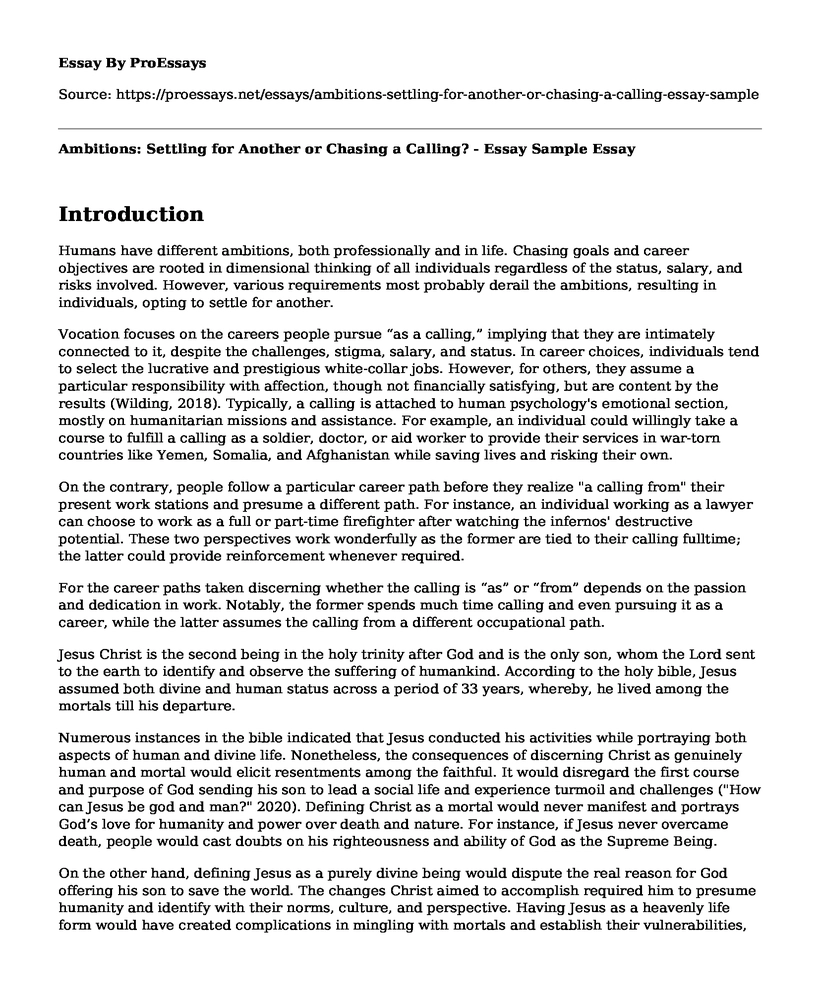Introduction
Humans have different ambitions, both professionally and in life. Chasing goals and career objectives are rooted in dimensional thinking of all individuals regardless of the status, salary, and risks involved. However, various requirements most probably derail the ambitions, resulting in individuals, opting to settle for another.
Vocation focuses on the careers people pursue “as a calling,” implying that they are intimately connected to it, despite the challenges, stigma, salary, and status. In career choices, individuals tend to select the lucrative and prestigious white-collar jobs. However, for others, they assume a particular responsibility with affection, though not financially satisfying, but are content by the results (Wilding, 2018). Typically, a calling is attached to human psychology's emotional section, mostly on humanitarian missions and assistance. For example, an individual could willingly take a course to fulfill a calling as a soldier, doctor, or aid worker to provide their services in war-torn countries like Yemen, Somalia, and Afghanistan while saving lives and risking their own.
On the contrary, people follow a particular career path before they realize "a calling from" their present work stations and presume a different path. For instance, an individual working as a lawyer can choose to work as a full or part-time firefighter after watching the infernos' destructive potential. These two perspectives work wonderfully as the former are tied to their calling fulltime; the latter could provide reinforcement whenever required.
For the career paths taken discerning whether the calling is “as” or “from” depends on the passion and dedication in work. Notably, the former spends much time calling and even pursuing it as a career, while the latter assumes the calling from a different occupational path.
Jesus Christ is the second being in the holy trinity after God and is the only son, whom the Lord sent to the earth to identify and observe the suffering of humankind. According to the holy bible, Jesus assumed both divine and human status across a period of 33 years, whereby, he lived among the mortals till his departure.
Numerous instances in the bible indicated that Jesus conducted his activities while portraying both aspects of human and divine life. Nonetheless, the consequences of discerning Christ as genuinely human and mortal would elicit resentments among the faithful. It would disregard the first course and purpose of God sending his son to lead a social life and experience turmoil and challenges ("How can Jesus be god and man?" 2020). Defining Christ as a mortal would never manifest and portrays God’s love for humanity and power over death and nature. For instance, if Jesus never overcame death, people would cast doubts on his righteousness and ability of God as the Supreme Being.
On the other hand, defining Jesus as a purely divine being would dispute the real reason for God offering his son to save the world. The changes Christ aimed to accomplish required him to presume humanity and identify with their norms, culture, and perspective. Having Jesus as a heavenly life form would have created complications in mingling with mortals and establish their vulnerabilities, fears, immorality, and injustices.
Being tortured, whipped, mocked, crucifixion, and the reaction after finding traders abusing his father's house could not have been realized if Christ was portrayed as a holy and divine being. Allowing Jesus to elicit both aspects of life represent God’s love for humanity by showing the connection between him and human beings through sacrificing his son to undergo the suffering. Being truly human implies that people are susceptible to evil, injustices, death, and temptations.
References
How can Jesus be God and man? (2020, April 28). Desiring God. https://www.desiringgod.org/articles/how-can-jesus-be-god-and-man
Wilding, M. (2018, April 23). Do you have a job, career or calling? The difference matters. Forbes. https://www.forbes.com/sites/melodywilding/2018/04/23/do-you-have-a-job-career-or-calling-the-difference-matters/#38cd903c632a
Cite this page
Ambitions: Settling for Another or Chasing a Calling? - Essay Sample. (2023, Aug 21). Retrieved from https://proessays.net/essays/ambitions-settling-for-another-or-chasing-a-calling-essay-sample
If you are the original author of this essay and no longer wish to have it published on the ProEssays website, please click below to request its removal:
- Professional Discovery: FBI Agent
- Competency and Career Paper Example
- Traditional Media Jobs and the Digital Media Jobs Compare and Contrast Essay
- Three Key Learnings From Placement Experience - Essay Sample
- Job Satisfaction & Organizational Justice: A Study of UAE Employees - Essay Sample
- Essay on Social Media in the Workplace: How Employers Can Guide its Use
- Paper Sample on Burnout, Turnover Intention and Saudi Arabia







